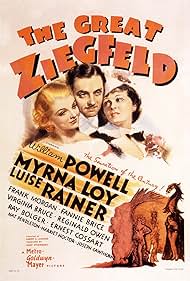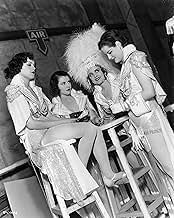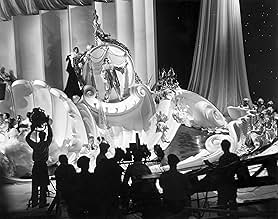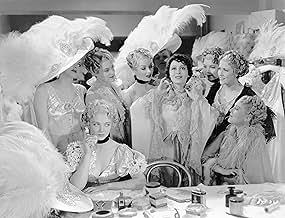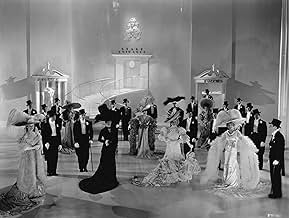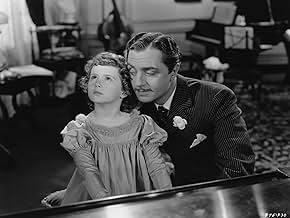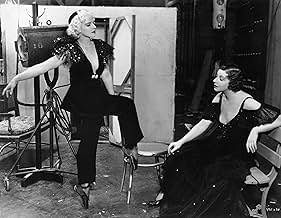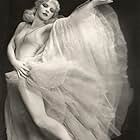Os altos e baixos de Florenz Ziegfeld Jr., famoso produtor de revistas musicais extravagantes.Os altos e baixos de Florenz Ziegfeld Jr., famoso produtor de revistas musicais extravagantes.Os altos e baixos de Florenz Ziegfeld Jr., famoso produtor de revistas musicais extravagantes.
- Direção
- Roteirista
- Artistas
- Ganhou 3 Oscars
- 8 vitórias e 5 indicações no total
- Fannie Brice
- (as Fannie Brice)
- Dr. Ziegfeld
- (as Joseph Cawthorne)
Avaliações em destaque
Florenz Ziegfield was one of the most brilliant producers of this country at the end of the 19th and beginning of the 20th centuries. He had an eye for what worked on a stage. He was also the discoverer of a lot of the talent that went to have enormous careers of their own, long after they appeared in one of Mr. Ziegfeld's extravaganzas.
Robert Z. Leonard in directing this film had a lot of contributors, no doubt, but it's probably Adrian, the costume designer par excellence that gave this movie a lot of class by recreating for the screen some of the costumes that were associated with Ziegfeld.
William Powell portrays the great Ziegfeld. Mr. Powell is amazing in his interpretation of the creative man on the screen. He is this man he is playing on the screen; he is totally convincing he was born to play the role.
Actually the film leaves a lot of things unexplained. We know that Anna Held is out of the picture, after her divorce, but nothing is mentioned that she had died at all. Also, the relationship with his second wife, Billie Burke, comes as an afterthought since she only appears in the last part of the movie.
Luise Ranier made a compelling Anna Held, the French actress, who obviously never understood her husband, even though it's clear she loved him. She appears as a complete insecure person, never knowing what to do, or what to decide on. As far as the Oscar she won for playing this role, it eludes my comprehension, or maybe that year her competition must have been poor.
Myrna Loy as Billie Burke gives a radiant performance. She was always a convincing actress and in the film she demonstrates her versatility in playing a musical comedy star. The young Myrna Loy was a gorgeous creature, as proven in this film.
The costumes from some of the musical numbers are incredible. Of course, they were made to suit the theatricality of whatever Mr. Ziegfeld presented. Such extravagant numbers will never be presented on a Broadway stage ever again as the cost would be prohibitive.
Virginia Bruce, Frank Morgan, Ray Bolger, Fanny Brice appear in the film, but of course, the picture is dominated by William Powell from beginning to end.
Fast-forward to 1936, a couple of years after Ziegfeld's death, and cinema still bears his mark. Musicals (which were still often based around stage performances) were often showcases for a variety of dancing and singing talents, usually building to a spectacular finale. The Great Ziegfeld is more than just a biopic, it is the culmination of this strand in cinema; the first epic musical. Here we see the 30's musical's shimmering sets and full-on dance routines on a scale never before seen on the screen. Robert Z. Leonard directs with his usual sweeping camera moves, often slowly pulling back to reveal the size of the production. But he also lets his camera get deeply involved in the more dramatic scenes.
Apart from the various song-and-dance people involved, the casting here is very much a Hollywood affair. William Powell was then the go-to man for such smart and witty types. He and Myrna Loy were well-known as a screen couple, from The Thin Man pictures amongst others. They both give adequate portrayals, but in truth these two need a smaller, more intimate production to shine in their own right. The performance that best fits the size of The Great Ziegfeld is that of Luise Rainer. Melodramatic, full of presence, she seems always on the verge of breaking down into some farcical display of ham acting, but never quite does so. It's not a realistic performance by any stretch, but it is beautiful in its theatricality.
Ziegfeld's influence would live on in musical cinema for many years after his death. The Great Ziegfeld was just the first in a series of pictures tipping their hat to the producer. Meanwhile, many of the stars made famous by Ziegfeld – Billie Burke, Eddie Cantor, Will Rogers, Ray Bolger – were finding fruitful careers on the silver screen. It was, after all, the way of the future. You see, it wasn't just the depression that finished Ziegfeld. Even if he had lived, cinema would have provided him with too much competition to continue with his follies, especially with the advent of sound. But this is beside the point. If The Great Ziegfeld shows anything, it is that the spirit of showmanship that he championed could live on, if not in one medium then in another.
It's a spectacle made in the grand Old Hollywood fashion, heavy on melodrama and lavish musical numbers. Powell is fine in the lead. I have no idea how closely he "gets" Ziegfeld here, as he seems very much like William Powell's usual screen persona to me. He would reprise his role as Ziegfeld a decade later in 1946's Ziegfeld Follies (also from MGM). Luise Rainer is terrific in her Oscar-winning role as Ziegfeld's first wife, Anna. Myrna Loy is a little miscast as Billie Burke but it's hard to argue against any opportunity to see Powell and Loy on screen together. The rest of the cast includes solid supporting players Frank Morgan, Virginia Bruce, Ray Bolger, Reginald Owen, and Nat Pendleton. A. A. Trimble does a spot-on impersonation of Will Rogers.
It is a bit overlong. The first half could have done with some trimming. Still, a fine cast keeps things interesting and those musical numbers are dynamite. Dennis Morgan's "A Pretty Girl is Like a Melody" number is one of the highlights. The film was nominated for seven Academy Awards with three wins, including Best Picture and Best Actress for Rainer. Its award wins are the subject of debate for some today, who argue it is one of the least-deserving Best Picture winners. That's kind of laughable when you think about it, as the Best Picture Oscar rarely goes to the most deserving film. That was true then and is even more true today, in my opinion. It's definitely something you'll want to try out if you are a fan of classic Hollywood and all its glitz and glamour. They don't make 'em like this anymore.
Oscars Best Picture Winners, Ranked
Oscars Best Picture Winners, Ranked
Você sabia?
- CuriosidadesA.A. Trimble, who portrays Will Rogers in the film, was a Cleveland map salesman who frequently impersonated Rogers at Rotarian lunches.
- Erros de gravaçãoIn the "Rhapsody in Blue" portion of the mammoth "Pretty Girl" number, one of the silver-fringe-and-antlers quartet of dancers gets visibly disoriented when her group does its final moves. She's the second one from the left, and her movements are completely out of sync with the other three until, with a thump, she sits down on the stairs. Since the incredibly complex number was shot in very long takes, the error was allowed to remain in the film.
- Citações
Florenz Ziegfeld Jr.: [after catching Ray Bolger doing a little softshoe backstage] Buddy, you're better with your feet than you are with your broom.
Ray Bolger: Mr. Ziegfeld, you think so? Gee, I wish you'd give me a chance. I've got talent, and I'd like to get away from shifting scenery and moving props.
Florenz Ziegfeld Jr.: How long have you been a property boy?
Ray Bolger: Five years, but my heart hasn't been in it.
Florenz Ziegfeld Jr.: You've been working a long time without your heart, buddy.
- Cenas durante ou pós-créditosThe opening credits display the title of the film and the names of the stars in marquee lights, as they would be on Broadway.
- Versões alternativasThere is an Italian edition of this film, as Bonus Extra, on DVD "FOLLIE DI ZIEGFELD", re-edited with the contribution of film historian Riccardo Cusin. This version is also available for streaming on some platforms.
- ConexõesEdited into O Mundo é um Teatro (1941)
- Trilhas sonorasHarriet Hoctor Ballet
(1936) (uncredited)
(also called "A Circus Must Be Different in a Ziegfield Show")
Music by Con Conrad
Lyrics by Herb Magidson
Sung and danced by male and female choruses
Danced by Harriet Hoctor
Principais escolhas
- How long is The Great Ziegfeld?Fornecido pela Alexa
Detalhes
- Data de lançamento
- País de origem
- Idioma
- Também conhecido como
- El gran Ziegfeld
- Locações de filme
- Empresa de produção
- Consulte mais créditos da empresa na IMDbPro
- Tempo de duração2 horas 56 minutos
- Cor
- Proporção
- 1.37 : 1
Contribua para esta página

